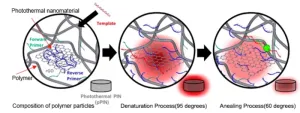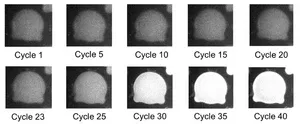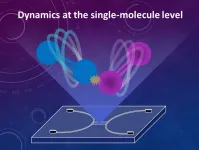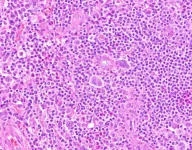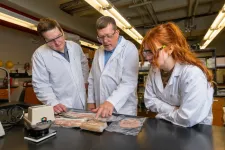(Press-News.org) PCR technology is a molecular diagnostics technology that detects target nucleic acids by amplifying the DNA amount. It has brought marked progress in the life sciences field since its development in 1984. This technology has recently become familiar to the public due to the COVID-19 pandemic, since PCR can detect nucleic acids that identify the COVID-19 virus. However, due to the technical nature of the PCR test, results cannot be immediately delivered. It takes at least 1 to 2 hours for the test as it requires repeated temperature cycles (60~95℃).
Dr. Sang Kyung Kim (Director) and Dr. Seungwon Jung’s research team at the Center for Augmented Safety System with Intelligence, Sensing of the Korea Institute of Science and Technology (KIST, President: Seok Jin Yoon) announced that they had developed an ultrafast PCR technology. By using photothermal nanomaterials, the ultrafast PCR shortens the test time by 10-fold, compared with the time taken for the existing test. The new method is completed in 5 minutes, with diagnostic performance equal to that of the existing test method.
Photothermal nanomaterials generate heat immediately upon light irradiation. As such, photothermal nanomaterials rapidly increase in temperature, but it is difficult to maintain performance due to their low stability. The KIST research team has developed a polymer composite that physically holds photothermal nanomaterials and can overcome their instability. By applying it to a PCR system, they have successfully developed a compact PCR system without a heat plate. In addition, they implemented a multiplex diagnostic technology that detects several genes at once, enabling it to distinguish several types of COVID-19 variants in a single reaction.
Director Sang Kyung Kim states, “through additional research, we plan to miniaturize the developed ultrafast PCR technology this year, to develop a device that can be utilized anywhere. While maintaining the strength of PCR as an accurate diagnostic method, we will increase its convenience, field applicability, and promptness, by which we expect that it will become a precision diagnostic device that can be used at primary local clinics, pharmacies, and even at home. In addition, PCR technology is a universal molecular diagnostic technology that can be applied to various diseases other than infectious diseases, so it will become more applicable.”
###
This research was carried out by the Practical Convergence Research Center, sponsored by the National Research Council of Science and Technology (Chairperson Bok Chul Kim), and published in the latest online issue of 'ACS Nano' (IF: 18.027, top 5.652% in the JCR field), an authoritative journal in the field of nanomaterials.
KIST was established in 1966 as the first government-funded research institute in Korea. KIST now strives to solve national and social challenges and secure growth engines through leading and innovative research. For more information, please visit KIST’s website at https://eng.kist.re.kr
END
A 5-minute PCR, faster than self-diagnosis kits
Development of ultrafast PCR technology using materials that generate heat when exposed to light, Expected for rapid diagnosis in pharmacies and clinics due to miniaturized device use
2023-02-22
ELSE PRESS RELEASES FROM THIS DATE:
Nanofluidic devices offer solutions for studying single molecule chemical reactions
2023-02-22
In a chemical reaction, molecules in different substances meet one another to form new molecules causing changes in the bonds of their atoms. The molecules collide at an extremely close distance—a nanometer or less—in an extremely short amount of time. This makes investigating the details of chemical reactions at the molecular scale difficult. Most experimental knowledge, used to explain single-molecule reaction dynamics, was obtained by studying reactions in gases. However, the overwhelming majority of chemical reactions take place in liquids, so elucidating single-molecule reaction dynamics in solution is an important challenge, with very few experimental ...
Keck School of Medicine study finds “forever chemicals” disrupt key biological processes
2023-02-22
A team of researchers from the Keck School of Medicine of USC found that exposure to a mixture of synthetic chemicals found widely in the environment alters several critical biological processes, including the metabolism of fats and amino acids, in both children and young adults. The disruption of these biological processes is connected to an increased risk of a very broad range of diseases, including developmental disorders, cardiovascular disease, metabolic disease and many types of cancer.
Known as per- and polyfluoroalkyl substances, or PFAS, these man-made chemicals are used in a wide range of consumer and industrial products. PFAS are sometimes ...
Public voting now open for the 2023 Morgridge Ethics Cartooning Competition
2023-02-21
Eighteen cartoons have been selected as finalists in the 2023 Ethics Cartooning Competition, an annual contest sponsored by the Morgridge Institute for Research.
Participants from the University of Wisconsin-Madison and affiliated biomedical centers or institutes submitted their work, then a panel of judges selected the final cartoons for display to the public, who is invited to vote and help determine the 2023 winners.
This year’s cartoons depict a variety of research ethics topics, such as the ethics of scientific publishing, research funding and environments, questionable research practices, ...
BTI promotes faculty member Fay-Wei Li
2023-02-21
The Boyce Thompson Institute (BTI) is delighted to announce that faculty member Fay-Wei Li has been promoted to Associate Professor on January 13. Li was evaluated on his achievements to date and likelihood of continued success in the future.
Since joining BTI in 2017, Li has developed an internationally-recognized program on seed-free plants, both in terms of genome sequencing and in making biological discoveries. He also is an excellent science communicator, with a knack for explaining the importance of scientific discoveries to a wide range of audiences.
The ...
Digital content could be altering your visual perception, new research shows
2023-02-21
BINGHAMTON, N.Y. – So much of modern life is spent on screens: Zoom meetings and websites, smartphones and videogames, televisions and social media. How are all those pixels and rectangles affecting how we see?
Binghamton University, State University of New York Professor of Psychology Peter Gerhardstein and doctoral candidate Nicholas Duggan explore the phenomenon in “Levels of Orientation Bias Differ Across Digital Content Categories: Implications for Visual Perception,” recently published in the journal Perception. Their paper covers the extent to which online content ...
NIH awards researchers $3.14 million grant to design novel model aimed at reducing healthcare disparities
2023-02-21
CLEVELAND: Supported by a new $3.14 million grant from the National Institutes of Health to Cleveland Clinic, researchers are using an emerging technology known as “digital twins” to better understand healthcare disparities based on where someone lives. Researchers from Cleveland Clinic and MetroHealth aim to use this information to develop strategies designed to reduce these disparities in health outcomes.
The research team, led by Jarrod Dalton, Ph.D., of Cleveland Clinic, and Adam Perzynski, Ph.D., of MetroHealth, ...
Study: Whole genome sequencing provides unprecedented detail on the genetic evolution of Hodgkin lymphoma
2023-02-21
(MIAMI, FL, FEB. 21, 2023) – To create the most effective, personalized treatment plans for patients with Hodgkin lymphoma or other cancers, scientists and clinicians need the clearest picture of the genetic changes leading to the cancer’s development. That picture, say scientists at Sylvester Comprehensive Cancer Center in the University of Miami Miller School of Medicine, comes into much better focus when whole genome sequencing – rather than the current standard, exome sequencing – is used to identify changes driving the cancer.
Exome sequencing, which reads only protein-coding genes, can detect some specific mutations and other variants that propel cancers, ...
Texas A&M meat scientist developing ‘no nitrite-added’ cured meats
2023-02-21
Written by Kay Ledbetter, 806-547-0002, skledbetter@ag.tamu.edu
Imagine your favorite cured meat like beef jerky, pepperoni or bacon without any added sodium nitrite from any source currently necessary for color and shelf life. Wes Osburn, Ph.D., is doing exactly that.
At center, Wes Osburn, Ph.D., Texas A&M University meat scientist, is working in his lab with students Tanner Wright and Arlie Reeves on a new no nitrite-added cured meat system. (Texas A&M AgriLife photo ...
Conifer-killing beetles use smell of beneficial fungus to select host trees
2023-02-21
Eurasian spruce bark beetles (Ips typographus) burrow into the bark of Norway spruce (Picea abies) trees where they mate and lay their eggs. Major outbreaks in Europe have decimated millions of hectares of conifer forests. The beetles preferentially attack trees that are already infected with symbiotic fungi (such as Grosmannia penicillata), which is thought to weaken host trees and break down their chemical defenses, allowing the beetles to successfully develop in the bark.
To investigate the chemical signals ...
Symbiotic fungi transform terpenes from spruce resin into attractants for bark beetles
2023-02-21
The mass outbreaks of bark beetles observed in recent years have caused shocking amounts of forest damage throughout Germany. As reported by the Federal Statistical Office in July 2022, more than 80% of the trees that had to be felled in the previous year were damaged by insects. The damaged timber felled due to insect damage amounted to more than 40 million cubic meters. One of the main pests is the European spruce beetle Ips typographus. In the Thuringian Forest and the Harz Mountains, for example, the beetle, which is only a few millimeters long, encountered spruce monocultures that had already been weakened by high temperatures and extended ...
LAST 30 PRESS RELEASES:
Brainwaves of mothers and children synchronize when playing together – even in an acquired language
A holiday to better recovery
Cal Poly’s fifth Climate Solutions Now conference to take place Feb. 23-27
Mask-wearing during COVID-19 linked to reduced air pollution–triggered heart attack risk in Japan
Achieving cross-coupling reactions of fatty amide reduction radicals via iridium-photorelay catalysis and other strategies
Shorter may be sweeter: Study finds 15-second health ads can curb junk food cravings
Family relationships identified in Stone Age graves on Gotland
Effectiveness of exercise to ease osteoarthritis symptoms likely minimal and transient
Cost of copper must rise double to meet basic copper needs
A gel for wounds that won’t heal
Iron, carbon, and the art of toxic cleanup
Organic soil amendments work together to help sandy soils hold water longer, study finds
Hidden carbon in mangrove soils may play a larger role in climate regulation than previously thought
Weight-loss wonder pills prompt scrutiny of key ingredient
Nonprofit leader Diane Dodge to receive 2026 Penn Nursing Renfield Foundation Award for Global Women’s Health
Maternal smoking during pregnancy may be linked to higher blood pressure in children, NIH study finds
New Lund model aims to shorten the path to life-saving cell and gene therapies
Researchers create ultra-stretchable, liquid-repellent materials via laser ablation
Combining AI with OCT shows potential for detecting lipid-rich plaques in coronary arteries
SeaCast revolutionizes Mediterranean Sea forecasting with AI-powered speed and accuracy
JMIR Publications’ JMIR Bioinformatics and Biotechnology invites submissions on Bridging Data, AI, and Innovation to Transform Health
Honey bees navigate more precisely than previously thought
Air pollution may directly contribute to Alzheimer’s disease
Study finds early imaging after pediatric UTIs may do more harm than good
UC San Diego Health joins national research for maternal-fetal care
New biomarker predicts chemotherapy response in triple-negative breast cancer
Treatment algorithms featured in Brain Trauma Foundation’s update of guidelines for care of patients with penetrating traumatic brain injury
Over 40% of musicians experience tinnitus; hearing loss and hyperacusis also significantly elevated
Artificial intelligence predicts colorectal cancer risk in ulcerative colitis patients
Mayo Clinic installs first magnetic nanoparticle hyperthermia system for cancer research in the US
[Press-News.org] A 5-minute PCR, faster than self-diagnosis kitsDevelopment of ultrafast PCR technology using materials that generate heat when exposed to light, Expected for rapid diagnosis in pharmacies and clinics due to miniaturized device use
